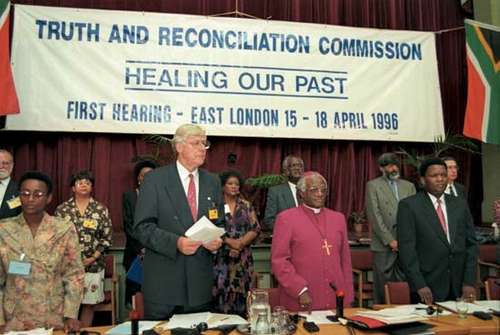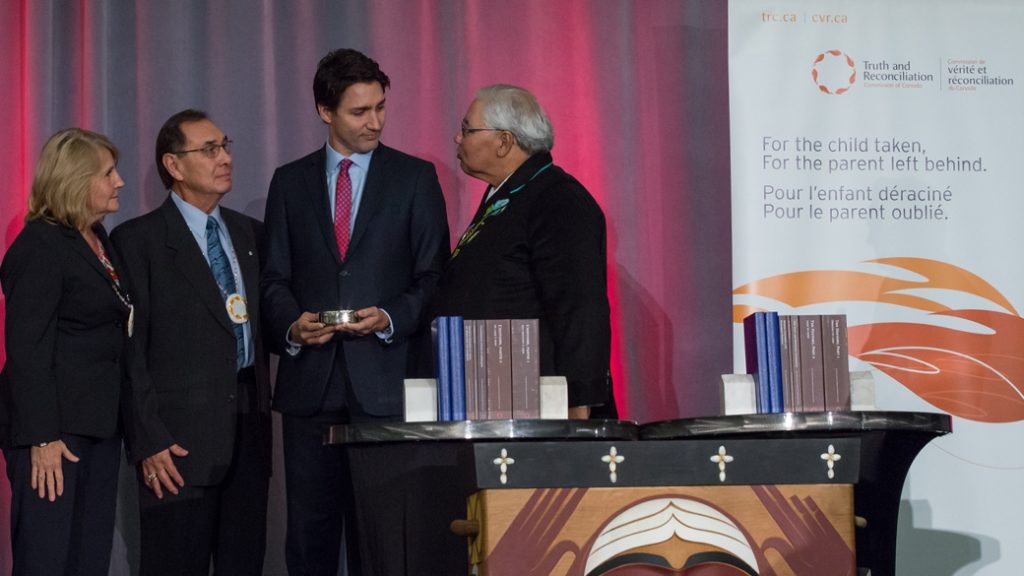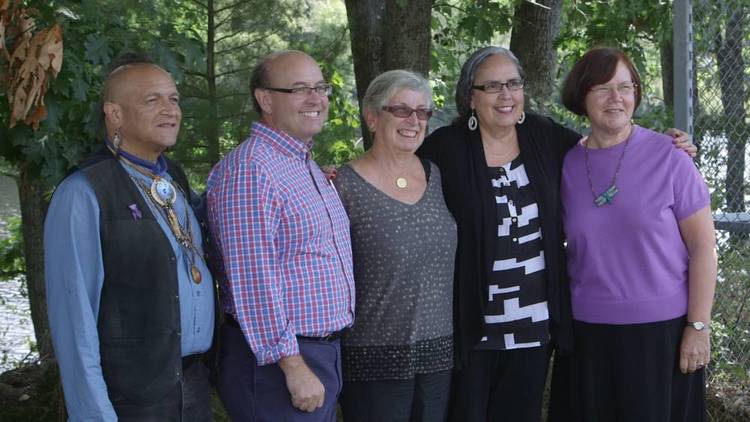Truth and Reconciliation doesn’t mean much to the everyday person walking down Main Street, America. For those countries and communities who are contemplating it or engaged in it, its a journey that leads to the healing between a government (or dominant people) and a subjugated or conquered people.
Truth
A truth and reconciliation movement starts with the “Truth,” an in-depth look into the past, identifying, tracing, recognizing and acknowledging wrongdoing on the part of the dominant culture. This requires the dominant group to research, in detail, all the abuses it engaged in, including genocide, enslavement, family separations, stealing resources (land, water etc.) and other human rights violations that have had a lasting impact on the conquered population. It requires hearing the voices of the conquered population as they tell their stories of the harm experienced and the intergenerational trauma that was the result.
Reconciliation
“Reconciliation” is the attempt by the dominant group to make reparations for the abuses that occurred. Sometimes this may mean punishment for perpetrators, repatriation, peace agreements, issuing apologies, recompense of things stolen and some form of healing for the emotional and and spiritual wounds that have affected individuals of a conquered population as well as the whole community.
Brief History on Truth and Reconciliation

Truth and Reconciliation movements, as we now recognize them, began in the 1990s and have been conducted in several countries on all continents. There are the movements throughout Africa, most notably South Africa during the post-apartheid period. In Latin America several movements included addressing the disappearance of activists opposing military dictatorships. In Asia, Nepal worked to address the human rights violations of the Panchayat System during the 1960s-1990s.
Truth and Reconciliation in Canada.

The Truth and Reconciliation movement most known to those of us in the U.S. is that of Canada. It was established in 2007 under the Indian Residential Schools Settlement Agreement which was a section within ruling by the courts in a lawsuit brought in the 1991 over the Oka Crisis (Quebec). The Oka Crisis was a land dispute between the government of Canada and the Mohawk Nation with a history dating back to the 1700s and culminated in a standoff in 1990. The Truth and Reconciliation Commission of Canada was established predominantly to address the myriad of issues faced by aboriginal communities as a result of their children being taken away and placed in Residential Schools, not dissimilar to the U.S. boarding schools.
Truth an Reconciliation in the U.S.

With the exception of one case, there has been no formal Truth and Reconciliation in the United States. That exception being in the State of Maine with the Wabanaki people where a Maine-Wabanaki State Child Welfare Truth and Reconciliation Commission was established in 2012 after several years of attempting to respond to violations of the Indian Child Welfare Act. The Commission issued it’s final report in 2015. The Wabanaki, also called the “People of the Dawnland” and the T&R Commission are the subject of a documentary about the commission entitled “Dawland” by the Upstander Project.
An effort is underway on a federal level with the National Native American Boarding School Healing Coalition (NABS). Deborah Parker, CEO and member of Tulalip Tribes, is from Washington State and is a familiar presence to WA UUs. There are resources on the NABS website for individuals and organizations researching U.S.-based Indian boarding school information. They are also working to pass federal Truth and Reconciliation legislation, S.1723/HR.7227, and need our support. S1723, the Senate version of the bill, is being prepared for a flood vote. The S7227, the House version, appears to be in the Education and the Workforce Committee and the Natural Resources; Energy and Commerce Committee. Recommended actions would to be to ask your federal Representative or Senators to sign-on (if still possible) and/or thank your representative for being a co-sponsor. Encourage your Senators and Representatives to vote affirmatively for the legislation once they hit their respect floors which in the Senate, we hope would be soon.
Western House of Representatives co-sponsoring S.7227:
Rep. Napolitano, Grace F. [D-CA-31]
Rep. Schiff, Adam B. [D-CA-30]
Rep. DeSaulnier, Mark [D-CA-10]
Rep. Khanna, Ro [D-CA-17]
Rep. Chu, Judy [D-CA-28]
Rep. Brownley, Julia [D-CA-26]
Rep. Harder, Josh [D-CA-9]
Rep. Kiley, Kevin [R-CA-3]
Rep. Lofgren, Zoe [D-CA-18]
Rep. Kilmer, Derek [D-WA-6]
Rep. Jayapal, Pramila [D-WA-7]
Rep. Larsen, Rick [D-WA-2]
Rep. Perez, Marie Gluesenkamp [D-WA-3]
Rep. DelBene, Suzan K. [D-WA-1]
Rep. Chavez-DeRemer, Lori [R-OR-5]
Rep. Bonamici, Suzanne [D-OR-1]
Rep. Peltola, Mary Sattler [D-AK-At Large]
Rep. Ciscomani, Juan [R-AZ-6]
Rep. Tokuda, Jill N. [D-HI-2]
Rep. Zinke, Ryan K. [R-MT-1]
Rep. Leger Fernandez, Teresa [D-NM-3]
Western Cosponsors for S1723 include:
Cosponsor
Sen. Hickenlooper, John W. [D-CO]*
Sen. Padilla, Alex [D-CA]*
Sen. Merkley, Jeff [D-OR]*
Sen. Hirono, Mazie K. [D-HI]*
Sen. Sinema, Kyrsten [I-AZ]*
Sen. Kelly, Mark [D-AZ]*
Sen. Cortez Masto, Catherine [D-NV]*
Sen. Lujan, Ben Ray [D-NM]*
Sen. Wyden, Ron [D-OR]*
Sen. Bennet, Michael F. [D-CO]*
Sen. Schatz, Brian [D-HI]*
Sen. Cantwell, Maria [D-WA]*
Sen. Heinrich, Martin [D-NM]*
Sen. Murray, Patty [D-WA]*
Sen. Tester, Jon [D-MT]*
Sen. Rosen, Jacky [D-NV]
Sen. Feinstein, Dianne [D-CA]
Sen. Butler, Laphonza R. [D-CA]
Indigenous and NGO organizers in Washington State (including the Bellingham Unitarian Fellowship) did an initiate a Truth and Reconciliation movement effort in 2018 that was, unfortunately, unable to sustain itself as it is a very complex and political issue. However, the State did convene a “Washington State Truth and Reconciliation Tribal Advisory Committee” in October 2023. Background info on the Committee is here and meeting info is here.